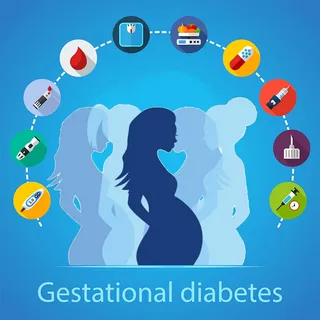Gestational diabetes is a form of diabetes that can develop during pregnancy in women without any previous history of diabetes. Gestational diabetes, is a condition that typically goes away after giving birth. While it can occur at any point during pregnancy, the second or third trimester is when it occurs most frequently.
Causes of Gestational Diabetes
Body’s inability to produce enough insulin during pregnancy results in gestational diabetes or gestational diabetes mellitus. Our pancreas secretes the hormone insulin, which functions as a key to allow blood sugar to enter the body’s cells so that it can be used as fuel. As gestational period is marked with a certain weight gain and hormone changes in the body, excessive weight gain can result in insulin resistance.
Insulin can be blocked by a combination of the hormones released during pregnancy such as human placental lactogen, cortisol, and estrogen. This phenomenon, known as the contra-insulin effect, typically starts between weeks 20 and 24 of pregnancy. Insulin resistance is the state in which body cells use insulin less efficiently and the requirement of insulin increases in turn. Consequently, if not managed, it leads to the development of gestational diabetes and increases the risk of type 2 diabetes after gestational diabetes.
Gestational Diabetes Symptoms
Usually, gestational diabetes mellitus is asymptomatic however, some physiological manifestations may be indicative of gestational diabetes. These include fatigue, tiredness, increased thirst, increased urination, blurred vision and nausea. Additionally, regular screening and monitoring is important to check if gestational diabetes is present or not.

Diagnosis of Gestational Diabetes
Typically, a gestational diabetes range of 140 to 150 mg/dL in screening indicates further testing for gestational diabetes mellitus diagnosis. In order to diagnose gestational diabetes, it is necessary to check pregnant patients’ blood glucose levels. Most medical professionals diagnose gestational diabetes by performing gestational diabetes test in two steps:
- The Initial Glucose Challenge Test (GCT) is a pregnancy test that measures blood glucose levels by drinking a glucose solution and drawing blood after an hour. It is typically conducted between 24th and 28th week of pregnancy.
- A follow-up glucose tolerance test (GTT) is performed if initial GCT indicates elevated glucose levels, measuring fasting blood glucose levels, drinking a concentrated glucose solution, and taking blood samples at specified intervals.
Gestational Diabetes Mellitus Risk Factors
Although gestational diabetes can be developed in any pregnant lady, however there are some factors that increase the risk of developing gestational diabetes which include:
- Being overweight or obese
- Having a familial history of diabetes mellitus
- Being physically less active
- Having pre diabetic condition
- Glycosuria, excessive levels of glucose in urine
- PCOS (Polycystic Ovarian Syndrome)
- Previous birth of any high birth weight baby (weighing more than 9 pounds)
Gestational Diabetes Complications
Gestational diabetes increases the following risks in pregnant females:
- Raised blood pressure
- Increased risk of Caesarian delivery
- Developing obesity and metabolic syndrome after delivery
- Incidence of type 2 diabetes after gestational diabetes, in later stages of life
Moreover, gestational diabetes affect on baby include:
- Preterm birth
- Birth of babies with high body weight of more than 9 pounds
- Babies born with breathing problems
Gestational Diabetes Treatment
Although gestational diabetes mellitus treatment is governed by individual factors such as age of the patient, her history, stage and extent of the disease. However, general treatment includes a specialized and modified diet, work out, monitoring blood sugar levels every day and delivering injections of insulin or medications with the prescription of a certified health professional or nutrition doctor. Ultimately, the goal of gestational diabetes treatment is to maintain normal blood glucose levels.
Prevention and Management of Gestational Diabetes
Maintaining a healthy weight and active lifestyle before pregnancy is the key to reduce the risk and preventing the development of gestational diabetes. Although during pregnancy, the condition cannot be averted, yet it can be managed with a healthy eating pattern, and adopting a physically active routine. Following factors are important in the management of gestational diabetes.
Choice of Foods:
Choice of foods that are low in calories and fat but high in fiber such as whole grains, fruits and vegetables is important. Moreover, add a variety of foods in your diet while keeping an eye on portion sizes.
Regular Exercise and Physical Activity:
Being physically active both before and during pregnancy can help lower your risk of gestational diabetes. For most days of the week, try to get in 30 minutes of moderate exercise. In addition, go for a daily brisk walk in order to increase glucose absorption and preventing complications.
Healthy and Monitored Weight Gain during Pregnancy:
It’s normal and healthy for pregnant women to gain some weight. However, gaining too much weight too soon can make gestational diabetes more likely. In addition, if you are overweight or obese, shedding excess weight before becoming pregnant could lead to a healthier pregnancy.
Gestational Diabetes Diet
Gestational diabetes can be carefully managed by following a healthy diet. Basics of a gestational diabetes mellitus diet plan include:
- Balancing Carbohydrates: Gestational diabetes often requires monitoring carbohydrate intake. Opt for complex carbohydrates such as whole grains, fruits, and vegetables. These foods release glucose more slowly, preventing rapid spikes in blood sugar levels.
- Incorporating Lean Proteins: Including lean proteins such as poultry, fish, beans, and tofu can help stabilize blood sugar levels. Moreover, proteins also provide essential nutrients for the baby’s development.
- Choosing Healthy Fats: Opt for healthy fats such as avocados, nuts, and olive oil. These fats are essential for fetal brain development and can contribute to satiety.
- Vitamins and Minerals: Many vitamins such as folate, vitamin A and vitamin D and minerals such as calcium, zinc and phosphorus are important in pregnancy. Always consult a nutrition doctor or nutritionist for adequate vitamins and minerals to maintain a healthy pregnancy.
Breakfast is an important meal of the day. Pregnant mothers should never skip breakfast as it can hinder baby’s nourishment and growth. Healthier options for gestational diabetes breakfast include Fruit and nuts yogurt bowl, oatmeal, vegetable omelette and whole grain pancakes.

Pakistani Diet Plan for Gestational Diabetes
Breakfast:
1 cup cooked oatmeal with a handful of sliced almonds
1 medium-sized apple
Snack:
1 cup Dates milkshake
Lunch:
1 cup cooked brown rice
1 cup cooked lentils (daal)
One serving of mixed vegetable salad
1 small bowl of yogurt
Snack:
1 cup cucumber & carrot slices with hummus
Dinner:
2 whole wheat chapattis
1 cup vegetable curry
Grilled kebabs (chicken or beef) with a side of mint chutney
1 cup quinoa salad with tomatoes, cucumbers, and bell peppers
Gestational Diabetes vegetarian meal plan
Creating a vegetarian meal plan involves focusing on plant-based protein sources such as whole grains, and plenty of vegetables. Incorporate plant foods such as lentils, chickpeas, tofu, and a variety of colorful vegetables into meals instead of meat and other animal foods. Replace milk with almond milk, oat milk or soy milk. Consult your dietitian or nutritionist for vitamins supplementation.
Gestational Diabetes Recipes
Some healthier gestational diabetes recipes include:
- Quinoa Salad with Roasted Vegetables: A nutrient-packed recipe that combines quinoa, roasted vegetables, and a light vinaigrette for a satisfying meal.
- Baked Salmon with Lemon and Herbs: Salmon is rich in omega-3 fatty acids, which are beneficial for both the mother and the baby’s development.
Take Away
In conclusion of gestational diabetes mellitus, regular screening and managing gestational diabetes through a well-thought-out diet is vital for the well-being of both the mother and the baby. By embracing balanced meal plans, incorporating nutritious breakfast ideas, and tailoring diets to specific cultural preferences, women with gestational diabetes can navigate this condition successfully. Always consult with a healthcare professional or a registered dietitian to create a personalized plan that suits individual needs and ensures a healthy pregnancy journey.

Zain Ul Abidin
Dietitian & Lifestyle Coach
